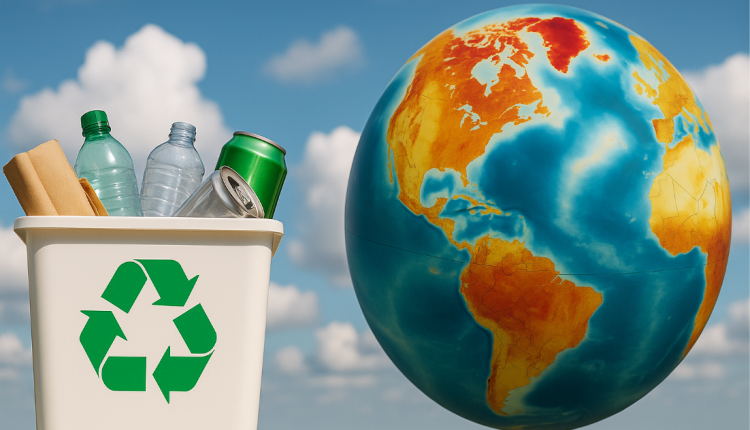- Advertisement -
Climate change stands as one of the most pressing challenges of our time, driven primarily by the accumulation of greenhouse gases (GHGs) in the atmosphere. While various strategies are being employed to combat this global issue, recycling emerges as a pivotal yet often underappreciated tool in reducing GHG emissions. By diverting waste from landfills, conserving energy, and reducing the need for virgin material extraction, recycling plays a multifaceted role in mitigating climate change.
Energy Conservation Through Recycling
The production of goods from recycled materials generally requires significantly less energy compared to manufacturing from virgin resources. For instance, recycling aluminum saves up to 95% of the energy needed to produce new aluminum from bauxite ore. Similarly, recycling paper can conserve about 60% of the energy compared to producing paper from fresh pulp. This energy conservation translates directly into reduced fossil fuel consumption and lower CO₂ emissions, thereby contributing to climate change mitigation.
Reduction of Methane Emissions from Landfills
Organic waste decomposing in landfills generates methane, a potent greenhouse gas with a global warming potential approximately 28 times greater than CO₂ over a 100-year period. By recycling organic materials through composting and anaerobic digestion, methane emissions from landfills can be significantly curtailed. Furthermore, diverting recyclable materials like paper and cardboard from landfills reduces the overall volume of waste, thereby decreasing the potential for methane generation.
Decreased Deforestation and Carbon Sequestration
Recycling paper products reduces the demand for virgin wood pulp, thereby lessening the pressure on forests. Forests act as carbon sinks, absorbing CO₂ from the atmosphere. By preserving forested areas through reduced logging, recycling contributes to maintaining these natural carbon sinks, which are crucial in regulating atmospheric CO₂ levels and mitigating climate change.
Lower Industrial Emissions
The extraction and processing of raw materials are energy-intensive processes that contribute substantially to industrial GHG emissions. Recycling mitigates these emissions by reducing the need for mining, refining, and processing raw materials. For example, producing steel from recycled scrap requires about 60% less energy than producing steel from iron ore, leading to a corresponding decrease in CO₂ emissions.
Promotion of Sustainable Consumption Patterns
Recycling fosters a culture of sustainability and environmental responsibility. By encouraging individuals and industries to consider the lifecycle of products, recycling promotes more sustainable consumption patterns. This shift can lead to increased demand for products made from recycled materials, further reducing the environmental footprint associated with production and consumption.
Challenges and Opportunities
Despite its benefits, recycling faces several challenges, including contamination of recyclable materials, inadequate recycling infrastructure, and fluctuating market demand for recycled products. Addressing these challenges requires investment in advanced recycling technologies, public education on proper recycling practices, and policies that incentivize the use of recycled materials. Embracing a circular economy model, where waste is minimized, and materials are continuously reused, presents a significant opportunity to enhance the role of recycling in combating climate change.
Conclusion
Recycling serves as a critical component in the multifaceted approach required to address climate change. By conserving energy, reducing landfill methane emissions, preserving forests, and lowering industrial emissions, recycling contributes significantly to the reduction of GHGs. Overcoming the existing challenges and capitalizing on the opportunities within recycling systems can amplify its impact, making it an even more effective tool in the global effort to mitigate climate change.

